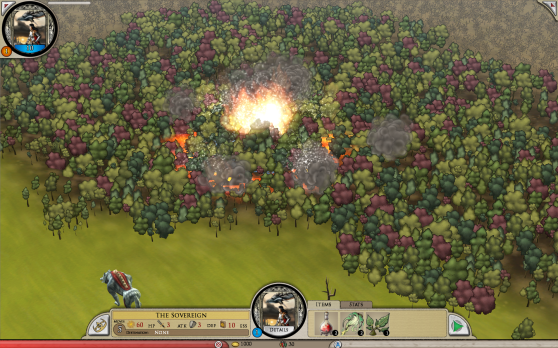Stardock Entertainment is girding itself for battle with the genre that nearly destroyed the company: fantasy strategy.
The developer’s first attempt was Elemental, starting in 2010 after seven years of success with the Galactic Civilizations 4X (“eXplore, eXpand, eXploit, and eXterminate”) space strategy series.
Rushed and buggy, Elemental: War of Magic was a flop that led to the company’s utter metamorphosis. Stardock went from a PC business-software company that happened to do games to a game house with a division that does PC software.
Tomorrow, Stardock plans to announce a new game in the genre. I visited the company’s airy, luxuriously appointed studios in Plymouth, Mich., to find out more about why it was willing to jump back in.
“Elemental was the fire that burned Stardock down so we could fly,” brand manager Adam Biessener said, catching his dramatic tone mid-sentence and adding with a smirk, “… like a beautiful bird. Our games are much better, honestly.”
It’s a story of rebirth and revival for one of the oldest surviving independent game developers.
A software company that made ‘nerd games’
Stardock started out as an OS/2 software publisher (an old IBM operating system), going on to make utilities for Windows. At one point, the company was earning money from every Windows PC sold. The gaming side of the business was always an afterthought, born from president and chief executive Brad Wardell’s interest in the hobby and in strategy.
“Basically, Brad was a huge nerd, and he wanted to make nerd games,” Biessener said.
A former Game Informer editor, Biessener joined the company last year, stuffing his office with poster-sized enlargements of cover stories and assorted gaming tchotchkes.
Wardell said most employees thought of his desire to develop games in the same way they thought of his beekeeping or other hobbies, even after Galactic Civilizations did well. Because of legal and distribution agreements, Stardock didn’t see any profits from either of the first two GalCiv titles, so Elemental felt like the first “real” project, he said.
“Up until that point, Stardock was basically a software company,” Wardell said. “The games were considered ‘Brad’s hobby.’ I had the bees, and I had the game.”
He did a little of everything along with his team, ranging from programming to dialogue. “My design document for Elemental was ‘Master of Magic with multiplayer. I’ll be back in two years to see what you’ve done.'”
A mad dash to fantasy strategy disaster
When it came time to release Elemental, Stardock went through a push familiar to most in the industry. Wardell said he would arrive at work Monday and not leave until Wednesday, snatching naps when he could, for four to five months straight. He wasn’t a coffee-drinker before, but that didn’t last.
“I knew when Starbucks opened and closed every night,” and remains an addict to this day, he said. (Indeed, he ordered a mocha Frappuccino from the local franchise at one point during our afternoon-long chat.)
Stardock couldn’t push back the Elemental release date because distribution contracts signed long before would have resulted in lawsuits. It didn’t have a producer.
Biessener said employees then scoffed that they didn’t need anyone but programming staff. The finished game showed it, and the reviews were scalding, calling it “disastrous,” an “excellent idea killed by ambitions,” that it had “the worst A.I. we remember so far,” and “the ugliest visuals since finger-painting class.” These also noted that it crashed constantly. And those were the professional reviews. You can imagine how gamers reacted.
A new direction and a mountain of cash
“It was horrible,” Wardell said, admitting that Elemental: War of Magic deserved its vicious reviews. He was nearing 40, and the fiasco made him and the rest of Stardock’s leadership seriously consider where and what they wanted the company to be.
“What is Stardock going to be about?” he remembers thinking at the time. “If we’re going to make games, we’re going to have to do it right.”
So the company made a dramatic shift. Stardock had developed Impulse, a digital distribution and multiplayer platform. Wardell said that process had become increasingly corporate, all about negotiating agreements and not about making games, and they decided to sell it to GameStop.
GameStop made the purchase and the separate acquisition of Spawn Labs from an earmarked $100 million fund in spring 2011.
People thought the sale was because of Elemental’s failure, that Stardock needed the money, Wardell said. But in reality, the game made money, and the company was still turning a profit from the PC software side. That’s just not the side he and the other executives wanted to concentrate on any more.
So they used Impulse to bankroll their rebirth as a gaming-focused company, eventually spinning off PC operations into a separate division called EdgeRunner.
“We suddenly had infinity dollars,” Wardell said.







